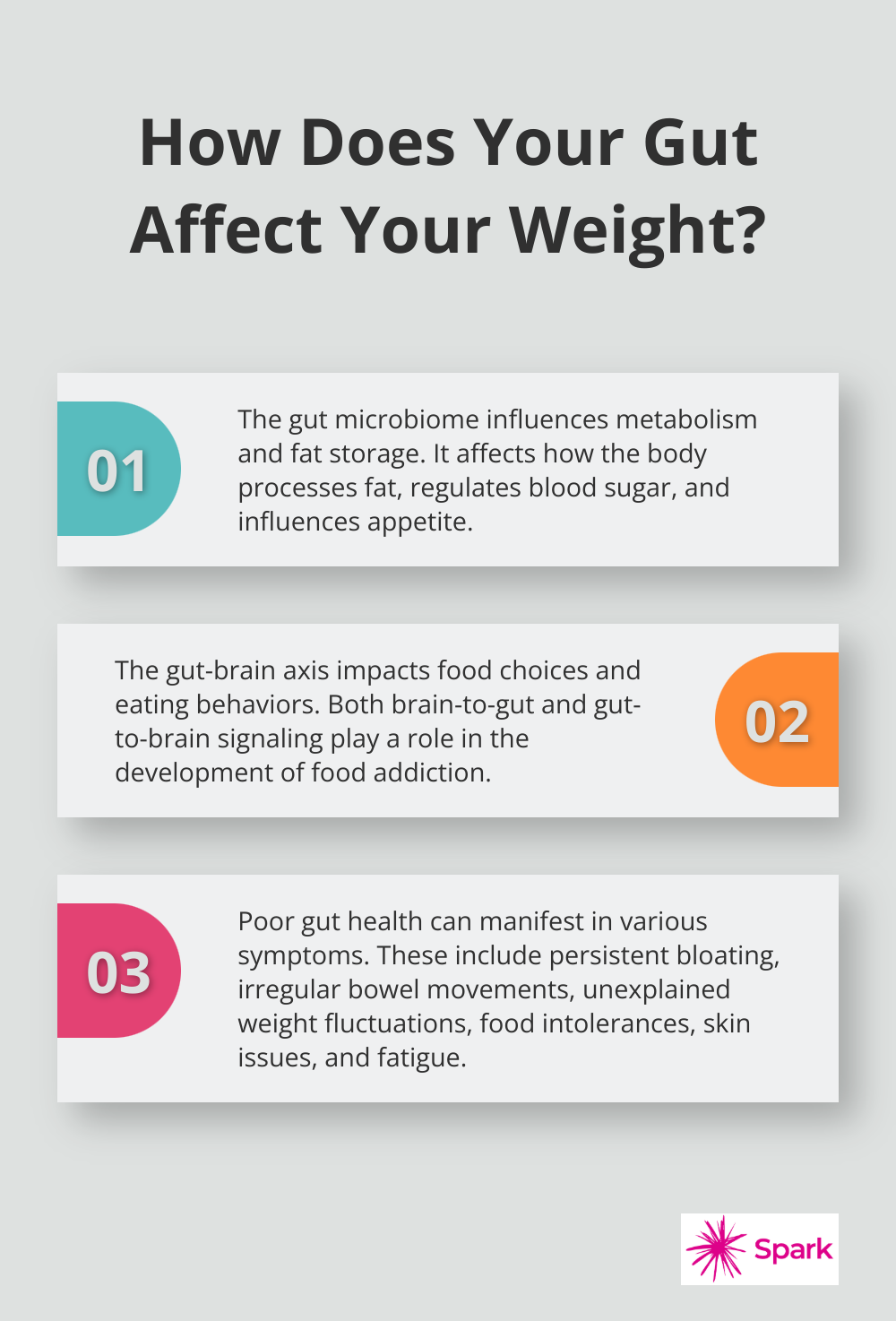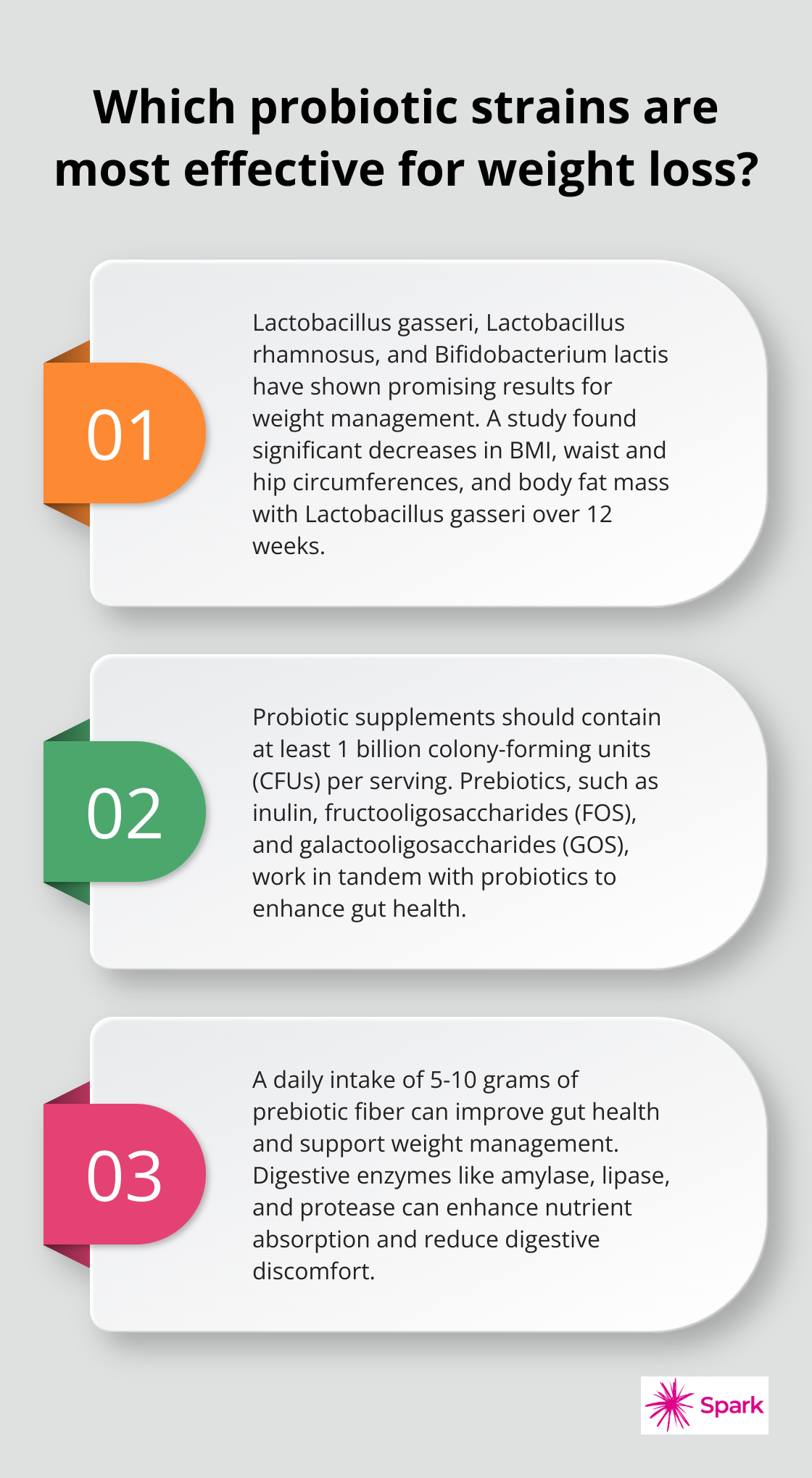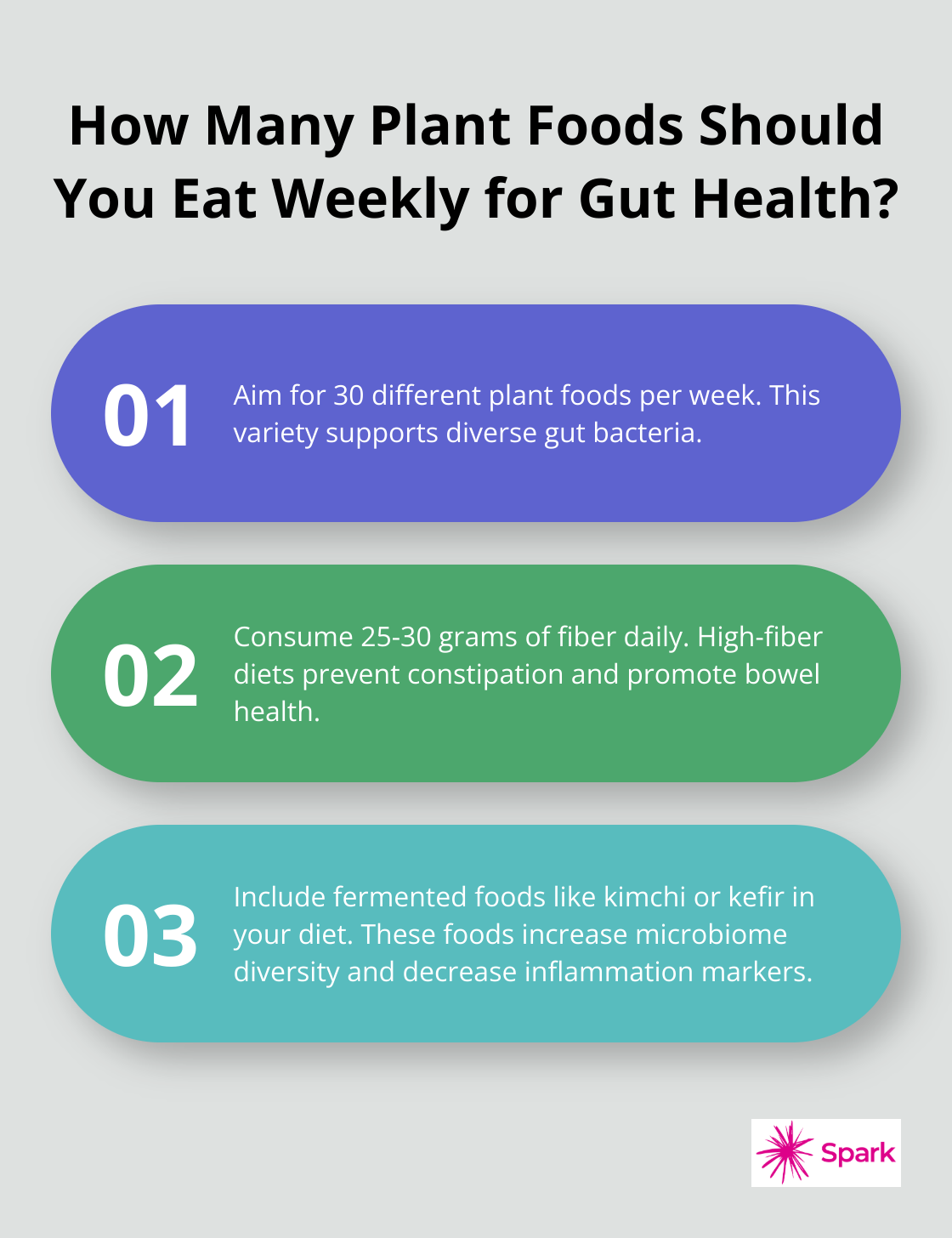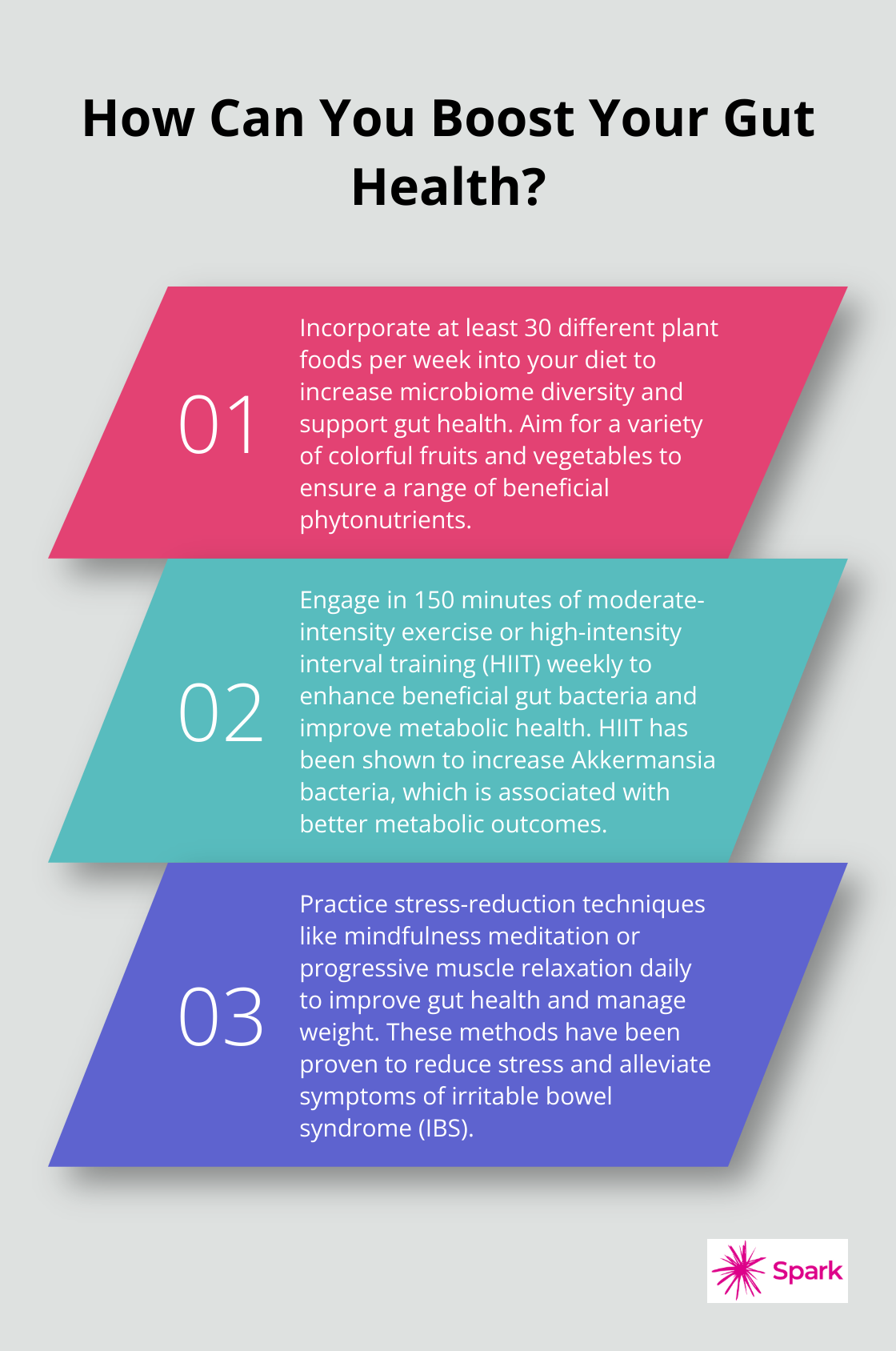At Spark Healthcare, we understand the profound impact gut health has on weight management. The intricate relationship between your digestive system and body weight goes beyond simple calorie counting.
In this post, we’ll explore the top gut health supplements for weight loss and how they can support your wellness journey. We’ll also discuss lifestyle factors that complement these supplements for optimal results.
The Gut-Weight Link: What You Need to Know
The Gut Microbiome: Your Metabolic Powerhouse
Your gut is more than just a digestive system. It’s a complex ecosystem that plays a significant role in your overall health, including your weight. The gut houses trillions of microorganisms, collectively known as the gut microbiome. These tiny inhabitants aren’t just passive residents; they actively participate in your metabolism.
Research shows that the gut microbiome affects how your body processes and stores fat, regulates blood sugar, and even influences your appetite. Evidence is emerging that the intestinal microbiome is intrinsically linked with overall health, including obesity risk. Different types of bacteria in your gut can have varying effects on your weight.
The Gut-Brain Axis: A Two-Way Street
Your gut and brain communicate constantly through what scientists call the gut-brain axis. This connection means that your gut health can influence your food choices and eating behaviors.
Studies indicate that the gut-brain axis can influence your food choices and eating behaviors. Each component of the brain-gut-microbiome axis has been implicated in the development of food addiction, with both brain to gut and gut to brain signaling playing a role.
Red Flags: Spotting Signs of Poor Gut Health
Recognizing the signs of poor gut health is essential for effective weight management. Here are some common indicators:
- Persistent bloating (often after meals)
- Irregular bowel movements (constipation or diarrhea)
- Unexplained weight fluctuations
- Food intolerances (new sensitivities to certain foods)
- Skin issues (acne or eczema)
- Fatigue (possibly due to interference with sleep patterns)

If you experience these symptoms, consider how your gut health might affect your weight management efforts. Many telehealth services (such as those offered by Spark Healthcare) can help you address these issues and develop a personalized plan for improving your gut health and managing your weight effectively.
The Impact of Diet on Gut Health
What you eat significantly influences your gut microbiome. A diet rich in diverse plant-based foods promotes a healthy gut ecosystem. On the other hand, a diet high in processed foods and added sugars can lead to an imbalanced microbiome, potentially contributing to weight gain.
Fiber-rich foods (like fruits, vegetables, and whole grains) feed beneficial gut bacteria. These bacteria produce short-chain fatty acids, which can help regulate appetite and metabolism. Fermented foods (such as yogurt, kefir, and sauerkraut) also support gut health by introducing beneficial bacteria directly into your digestive system.
As we explore the connection between gut health and weight management, it becomes clear that supporting your gut microbiome is a key factor in achieving and maintaining a healthy weight. In the next section, we’ll discuss specific supplements that can help optimize your gut health and support your weight management goals.
Gut Health Supplements for Effective Weight Management
Probiotics: Beneficial Bacteria for Your Gut
Probiotics are live bacteria that support digestive health. Various strains offer unique benefits for weight management. Lactobacillus gasseri, Lactobacillus rhamnosus, and Bifidobacterium lactis have shown promising results in reducing body weight and fat mass.

A study found that participants taking Lactobacillus gasseri showed significant decreases in BMI, waist and hip circumferences, and body fat mass over a 12-week period. When selecting a probiotic, try to find products with at least 1 billion colony-forming units (CFUs) per serving.
Prebiotics: Nourishment for Good Bacteria
Prebiotics are non-digestible fibers that feed beneficial gut bacteria. They work in tandem with probiotics to enhance gut health. Common prebiotic supplements include inulin, fructooligosaccharides (FOS), and galactooligosaccharides (GOS).
Research indicates that prebiotic fiber can increase feelings of fullness and reduce calorie intake. There is also some evidence of increased resistance to illness or infection with fiber intake. A daily intake of 5-10 grams of prebiotic fiber can improve gut health and support weight management efforts significantly.
Digestive Enzymes: Enhancing Nutrient Absorption
Digestive enzymes help break down food, which improves nutrient absorption and reduces digestive discomfort. Key enzymes to look for include amylase (for carbohydrates), lipase (for fats), and protease (for proteins).
The World Journal of Gastroenterology reported that digestive enzyme supplements can alleviate symptoms of indigestion and bloating, which often interfere with weight loss efforts. Consider taking a broad-spectrum enzyme supplement with meals to optimize digestion.
Omega-3s: Combating Inflammation
Omega-3 fatty acids, particularly EPA and DHA, have powerful anti-inflammatory properties that support gut health and weight management. They can help reduce gut permeability and inflammation (both linked to obesity).
A study assessed whether supplemental omega-3 fatty acids in conjunction with diet and exercise could augment weight loss over a 6-month period. Try to consume 1-2 grams of combined EPA and DHA daily. Fish oil is a common source, but algae-based supplements are available for vegetarians and vegans.
When considering these supplements, it’s important to choose high-quality products from reputable sources. Always consult with a healthcare professional before starting any new supplement regimen, especially if you have existing health conditions or are taking medications.
Supplements work best as part of a comprehensive approach to gut health and weight management. The next section will explore lifestyle factors that can enhance the effectiveness of these supplements and support your overall health goals.
How to Boost Gut Health Through Lifestyle Changes
Revamp Your Diet for Gut Health
Your diet shapes your gut microbiome. Try to increase your fiber intake to 25-30 grams per day. A high-fiber diet can help prevent constipation, promote bowel health, lower cholesterol levels, and regulate blood sugar levels.

Incorporate a variety of colorful fruits and vegetables into your meals. Each color represents different phytonutrients that support diverse gut bacteria. Try to eat at least 30 different plant foods per week. Studies suggest that a high-plant diet may have common beneficial effects on the gut microbiome across vertebrates.
Fermented foods boost gut health. Include foods like kimchi, sauerkraut, or kefir in your diet. A study in Cell found that a diet high in fermented foods increased microbiome diversity and decreased inflammation markers.
Move Your Body, Move Your Gut
Regular physical activity benefits your gut. Try to do at least 150 minutes of moderate-intensity exercise per week. Recent studies suggest that exercise can enhance the number of beneficial microbial species, enrich the microflora diversity, and improve the development of commensal bacteria.
High-intensity interval training (HIIT) shows promise for gut health. Frontiers in Microbiology reported that HIIT increased beneficial bacteria like Akkermansia, associated with better metabolic health.
Master Your Stress for a Healthier Gut
Chronic stress harms your gut health and weight management efforts. Implement stress-reduction techniques into your daily routine. The American Journal of Gastroenterology published a study showing that mindfulness meditation reduced stress and improved irritable bowel syndrome (IBS) symptoms.
Progressive muscle relaxation is another effective technique. The International Journal of Colorectal Disease found that this method reduced stress and improved quality of life in IBS patients.
Prioritize Sleep for Gut Health
Poor sleep disrupts your gut microbiome and contributes to weight gain. Try to get 7-9 hours of quality sleep per night. PLOS ONE published a study showing that just two nights of partial sleep deprivation caused gut microbiome changes associated with decreased insulin sensitivity and increased food intake.
Create a consistent sleep schedule (even on weekends). The National Sleep Foundation recommends keeping your bedroom cool (around 65°F or 18°C) and dark for optimal sleep. Avoid screens for at least an hour before bed, as blue light can interfere with your sleep-wake cycle.
By implementing these lifestyle changes, you can significantly improve your gut health and support weight loss. Remember, consistency is key when it comes to creating lasting habits for better health.
Final Thoughts
Gut health supplements for weight loss can significantly impact your digestive system and weight management efforts. Probiotics, prebiotics, digestive enzymes, and omega-3 fatty acids enhance your gut microbiome, improve nutrient absorption, and reduce inflammation. These supplements work best when combined with a balanced diet, regular exercise, stress management, and quality sleep.

We recommend consulting a healthcare professional before adding new supplements to your routine. They can provide personalized advice based on your individual health needs and help you avoid potential interactions. At Spark Mental Health, we offer telepsychiatry services that can address mental health aspects impacting your weight management journey.
No one-size-fits-all solution exists for gut health and weight management. What works for one person may not work for another. Patience is key as you explore different approaches and find what works best for you (this process can take time).






